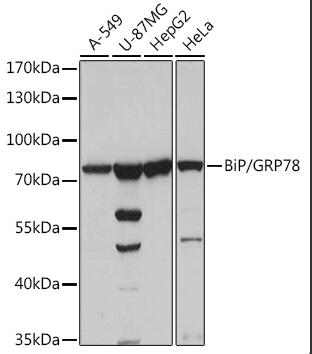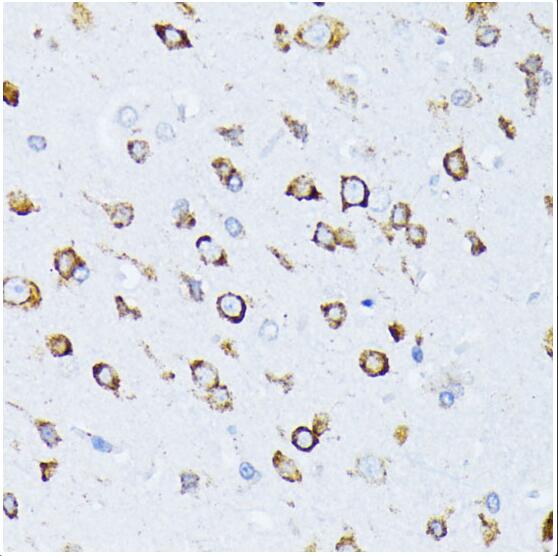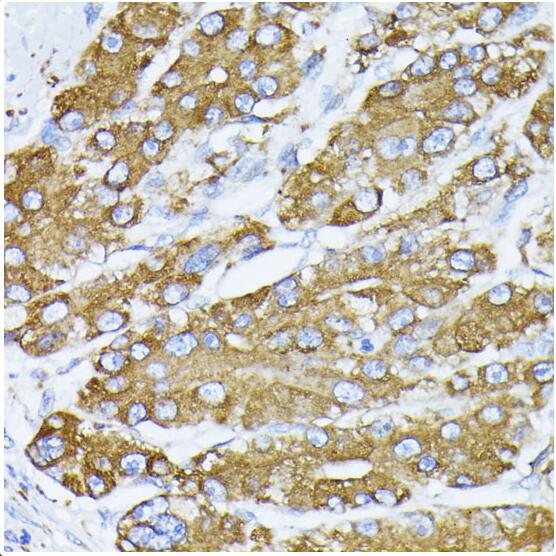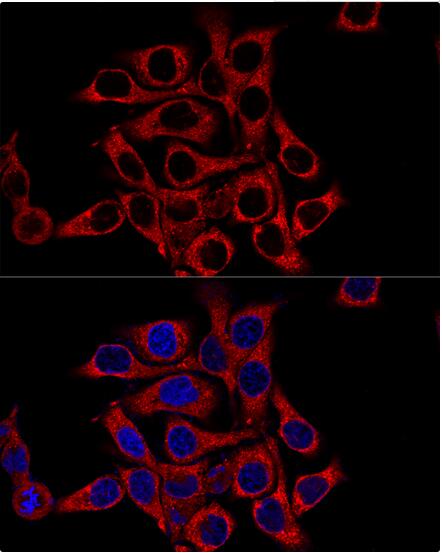Product Name :
GRP78 polyclonal antibody Background :
The HSP 70 family comprises four highly conserved proteins, HSP 70, HSC 70, GRP 75 and GRP 78, which serve a variety of roles. They act as molecular chaperones facilitating the assembly of multi-protein complexes, participate in the translocation of polypeptides across cell membranes and to the nucleus, and aid in the proper folding of nascent polypeptide chains. HSC 70, GRP 75 and GRP 78 are constitutively expressed in primate cells. HSP 70 expression is strongly induced in response to heat stress. HSP 70 and HSC 70, which are found in both the cytosol and nucleus of mammalian cells, play key roles in the cytosolic endoplasmic reticulum and mitochondrial import machinery. Product :
Rabbit IgG, 1mg/ml in PBS with 0.02% sodium azide, 50% glycerol, pH7.2 Storage&Stability :
Store at 4°C short term. Aliquot and store at -20°C long term. Avoid freeze-thaw cycles. Specificity :
GRP78 polyclonal antibody detects endogenous levels of GRP78 protein. Immunogen :
Recombinant full length Human GRP7. Conjugate :
Unconjugated Modification :
Unmodification
GRP78 polyclonal antibody Background :
The HSP 70 family comprises four highly conserved proteins, HSP 70, HSC 70, GRP 75 and GRP 78, which serve a variety of roles. They act as molecular chaperones facilitating the assembly of multi-protein complexes, participate in the translocation of polypeptides across cell membranes and to the nucleus, and aid in the proper folding of nascent polypeptide chains. HSC 70, GRP 75 and GRP 78 are constitutively expressed in primate cells. HSP 70 expression is strongly induced in response to heat stress. HSP 70 and HSC 70, which are found in both the cytosol and nucleus of mammalian cells, play key roles in the cytosolic endoplasmic reticulum and mitochondrial import machinery. Product :
Rabbit IgG, 1mg/ml in PBS with 0.02% sodium azide, 50% glycerol, pH7.2 Storage&Stability :
Store at 4°C short term. Aliquot and store at -20°C long term. Avoid freeze-thaw cycles. Specificity :
GRP78 polyclonal antibody detects endogenous levels of GRP78 protein. Immunogen :
Recombinant full length Human GRP7. Conjugate :
Unconjugated Modification :
Unmodification
-
 Western blot analysis of extracts of various cell lines, using BiP/GRP78 antibody at 1:1000 dilution.
Western blot analysis of extracts of various cell lines, using BiP/GRP78 antibody at 1:1000 dilution. -
 Immunohistochemistry of paraffin-embedded rat brain using BiP/GRP78 antibody at dilution of 1:100 (40x lens).
Immunohistochemistry of paraffin-embedded rat brain using BiP/GRP78 antibody at dilution of 1:100 (40x lens). -
 Immunohistochemistry of paraffin-embedded rat brain using BiP/GRP78 antibody at dilution of 1:100 (40x lens).
Immunohistochemistry of paraffin-embedded rat brain using BiP/GRP78 antibody at dilution of 1:100 (40x lens). -
 Immunohistochemistry of paraffin-embedded rat brain using BiP/GRP78 antibody at dilution of 1:100 (40x lens).
Immunohistochemistry of paraffin-embedded rat brain using BiP/GRP78 antibody at dilution of 1:100 (40x lens).
mTORC1 regulates PTHrP to coordinate chondrocyte growth, proliferation and differentiation
PMCID: Pubmed No.:27039827
Activation of volume-sensitive outwardly rectifying chloride channel by ROS contributes to ER stress and cardiac contractile dysfunction: involvement of CHOP through Wnt
PMCID: Pubmed No.:25412307
Baicalin Protects the Cardiomyocytes from ER Stress-Induced Apoptosis: Inhibition of CHOP through Induction of Endothelial Nitric Oxide Synthase
PMCID: Pubmed No.:24520378
Lack of seipin in neurons results in anxiety-and depression-like behaviors via down regulation of PPARγ
PMCID: Pubmed No.:24651066
Chronic restraint stress promotes learning and memory impairment due to enhanced neuronal endoplasmic reticulum stress in the frontal cortex and hippocampus in male mice.
PMCID: Pubmed No.:25482165
DBP-induced endoplasmic reticulum stress in male germ cells causes autophagy, which has a cytoprotective role against apoptosis in vitro and in vivo
PMCID: Pubmed No.:26804720
mTORC1 regulates PTHrP to coordinate chondrocyte growth, proliferation and differentiation
PMCID: Pubmed No.:27039827
Chronic restraint stress promotes learning and memory impairment due to enhanced neuronal endoplasmic reticulum stress in the frontal cortex and hippocampus in male mice.
PMCID: Pubmed No.:25482165
DBP-induced endoplasmic reticulum stress in male germ cells causes autophagy, which has a cytoprotective role against apoptosis in vitro and in vivo
PMCID: Pubmed No.:26804720
mTORC1 regulates PTHrP to coordinate chondrocyte growth, proliferation and differentiation
PMCID: Pubmed No.:27039827
Baicalin Protects the Cardiomyocytes from ER Stress-Induced Apoptosis: Inhibition of CHOP through Induction of Endothelial Nitric Oxide Synthase
PMCID: Pubmed No.:24520378
Lack of seipin in neurons results in anxiety-and depression-like behaviors via down regulation of PPARγ
PMCID: Pubmed No.:24651066
Inhibition of hepatocyte nuclear factor 1b induces hepatic steatosis through DPP4/NOX1-mediated regulation of superoxide
PMCID: Pubmed No.:28942246
The reproductive toxicology of male SD rats after PM2.5 exposure mediated by the stimulation of endoplasmic reticulum stress
PMCID: Pubmed No.:28961540
mTORC1 activation downregulates FGFR3 and PTH/PTHrP receptor in articular chondrocytes to initiate osteoarthritis
PMCID: Pubmed No.:28043938
miR-663 overexpression induced by endoplasmic reticulum stress modulates hepatocellular carcinoma cell apoptosis via transforming growth factor beta 1
PMCID: Pubmed No.:27073326
Lipopolysaccharide markedly changes glucose metabolism and mitochondrial function in the longissimus muscle of pigs
PMCID: Pubmed No.:26863995
Endoplasmic Reticulum Stress May Not Be Involved in Intestinal Epithelial Cell Apoptosis in Experimental Acute Pancreatitis
PMCID: Pubmed No.:25616612
Chronic restraint stress promotes learning and memory impairment due to enhanced neuronal endoplasmic reticulum stress in the frontal cortex and hippocampus in male mice
PMCID: Pubmed No.:25482165
The Roles of FGF21 and ALCAT1 in Aerobic Exercise-Induced Cardioprotection of Postmyocardial Infarction Mice
PMCID: Pubmed No.:34777697
Apoptosis Induction by Iron Radiation via Inhibition of Autophagy in Trp53+/-Mouse Testes: Is Chronic Restraint-Induced Stress a Modifying Factor?
PMCID: Pubmed No.:29989073
A zinc finger family protein, ZNF263, promotes hepatocellular carcinoma resistance to apoptosis via activation of ER stress-dependent autophagy
PMCID: Pubmed No.:32898766
Magnesium isoglycyrrhizinate attenuates acute alcohol-induced hepatic steatosis in a zebrafish model by regulating lipid metabolism and ER stress
PMCID: Pubmed No.:35331265
HIIT and MICT attenuate high-fat diet-induced hepatic lipid accumulation and ER stress via the PERK-ATF4-CHOP signaling pathway
PMCID: Pubmed No.:35315506
Rhabdomyolysis-induced acute kidney injury and concomitant apoptosis induction via ROS-mediated ER stress is efficaciously counteracted by epigallocatechin gallate
PMCID: Pubmed No.:36028100
Therapeutic propensity of ginsenosides Rg1 and Rg3 in rhabdomyolysis-induced acute kidney injury and renohepatic crosstalk in rats
PMCID: Pubmed No.:36580761
Mycobacterium tuberculosis PE_PGRS1 promotes mycobacteria intracellular survival via reducing the concentration of intracellular free Ca2+ and suppressing endoplasmic reticulum stress
PMCID: Pubmed No.:36584479
Bioworld Biotech only provide peptides for our antibodies and do not provide additional peptide customization services.
Price/Size :
USD 368/1mg/vial
Tips:
For phospho antibody, we provide phospho peptide(0.5mg) and non-phospho peptide(0.5mg).Describe :
Blocking peptides are peptides that bind specifically to the target antibody and block antibody binding. These peptide usually contains the epitope recognized by the antibody. Antibodies bound to the blocking peptide no longer bind to the epitope on the target protein. This mechanism is useful when non-specific binding is an issue, for example, in Western blotting (WB) and Immunohistochemistry (IHC). By comparing the staining from the blocked antibody versus the antibody alone, one can see which staining is specific; Specific binding will be absent from the western blot or IHC performed with the neutralized antibody.Formula:
Synthetic peptide was lyophilized with 100% acetonitrile and is supplied as a powder. Reconstitute with 0.1 ml DI water for a final concentration of 10 mg/ml.The purity is >90%,tested by HPLC and MS.
Storage:
The freeze-dried powder is more stable. For short time at 2-8°C. For long term storage store at -20°C.
Note :
This product is for research use only (RUO only). Not for use in diagnostic or therapeutic procedures.
 GRP78 polyclonal antibody
GRP78 polyclonal antibody  Datasheet
Datasheet COA
COA MSDS
MSDS SHIP
SHIP